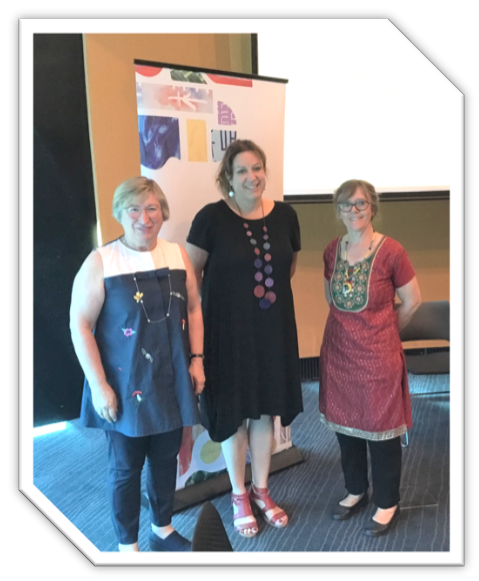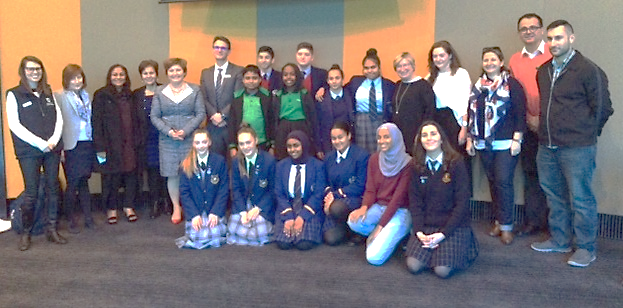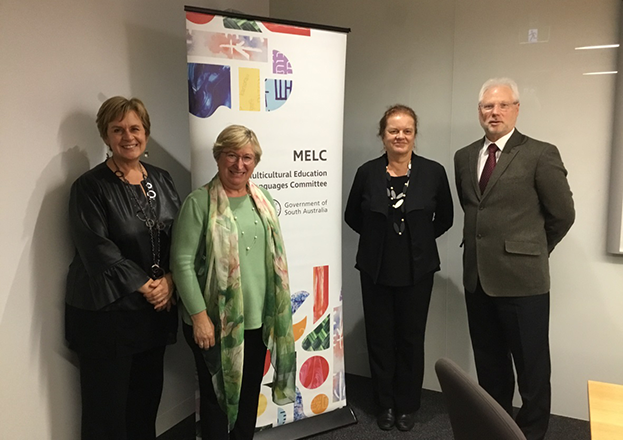On this page
The Multicultural Education and Languages Committee (MELC) invites high-level speakers (national and international) in the fields of languages education, multicultural education and the internationalisation of education to discussion forums with key stakeholders.
These events are a way to advance educational discussion, share ideas and opportunities, and develop advice for the Minister on the three interrelated areas of education. They focus on strengthening contemporary understandings and practices in relation to linguistic and cultural diversity.
Upcoming events
There are currently no upcoming events.
Past events
Expanding Understanding of EALD (English as an Additional Language and Dialect)
In February 2024, the MELC hosted the Expanding Understanding of EALD event which invited international guest and a world expert in EALD, Professor Constant Leung from the Department of Education and Professional Studies, King's College London as key facilitator of the program. This was a continuation of one of MELC’s priorities under its current Workplan 2023-2024 and also aligns with a key responsibility under the Committee’s Terms of Reference, ‘to promote, enhance and strengthen languages education including English as an Additional Language and Dialect’.
The three-day event included a public lecture where Professor Leung shared learnings from his most recent work within the EALD space and discussed the important link between literacy development in English, multilingual learning and capabilities, and learner wellbeing in the context of increasing and increasingly complex linguistic and cultural diversity in schools.
Professor Leung also facilitated an open conference for all education and tertiary sectors, a Roundtable seminar for teachers, leaders, and sector officers, and offered dedicated sessions with the three education sectors.
The changing nature of EALD in schools
Professor Constant Leung
The Minister has requested that MELC provide advice on how to promote, enhance and strengthen English as an Additional Language/Dialect (EALD) in schools.
To assist with formulating advice, in November 2019 MELC hosted a visit by Professor Constant Leung, Professor of Educational Linguistics, School of Education, Communication & Society, King’s College London. Professor Leung is a world-renowned expert in this field and has undertaken extensive research in schools.
As part of Professor Leung’s visit, MELC hosted an EALD forum, which explored the changing nature of EALD in schools. Professor Leung provided an opening presentation in which he offered his views on some of the different conceptualisations of EALD as a curriculum entity that have emerged over the past 40 years, nationally and internationally. He supported the discussion using examples of actual teaching approaches and materials. In the second part of his presentation he explored the issues and challenges engendered by the shifting views of ‘language’ as it relates specifically to language assessment.
He invited participants to think about diverse views of language, about multilingualism and the linguistic repertoires that students bring to their learning, and how we assess multilingual capabilities.
View a video recording of Professor Constant Leung’s presentation.
Aboriginal languages: challenges and opportunities for education in South Australia
Professor Rachel Nordlinger
To mark the 2019 International Year of Indigenous Languages, MELC hosted a discussion forum led by Professor Rachel Nordlinger, Director, Research Unit for Indigenous Languages, University of Melbourne.
The forum brought together community members, academics, consultants/advisers from the 3 education sectors, and representatives from Aboriginal Affairs and Reconciliation, the Department of the Premier and Cabinet and professional associations.
Professor Nordlinger’s opening presentation described Indigenous Australia as a land of enormous linguistic diversity, and yet, by contrast, mainstream Australia is strongly monolingual. Consequently, Aboriginal languages, while an important part of our nation’s linguistic heritage, are under rapid and increasing threat from English. She discussed Aboriginal languages, their interesting and unique characteristics, and the ways in which they reflect the culture and world views of their communities. Professor Nordlinger reminded participants of the power and value of languages, not only using languages, but learning about languages as they embed knowledge, insights and understandings of the world. She highlighted the importance of languages education in raising the profile and awareness of these languages for the benefit of all Australians.

Professor Nordlinger’s presentation was followed by further presentations from the schooling and tertiary sectors and discussion.
The discussion forum provided an opportunity for participants to reflect upon Aboriginal languages in education in our state, and consider how we, as a community, can continue this discussion and share initiatives and ideas in more proactive ways, so as to make a clear impact.
Left to right: Associate Professor Angela Scarino, Professor Rachel Nordlinger and Dr Mary-Anne Gale
The ecology of languages provision in South Australia
Professor Joseph Lo Bianco (AM)
In July 2019, MELC hosted a discussion forum on the ecology of languages provision in South Australia, which considered the interconnections between different kinds of provision for languages education and between mainstream and complementary providers. The discussion was led by Professor Joseph Lo Bianco, Professor of Language and Literacy Education at the Melbourne Graduate School of Education.
Professor Lo Bianco provided an introductory 30-minute presentation to stimulate discussion. The forum brought together leading educators from both the schooling and tertiary sectors.
Discussion points included: languages provision in early childhood programs; a national languages policy and what that could look like; the need for partnerships between mainstream and complementary providers in languages education; the role of technology in languages education; and multilingualism in 21st century literacy.
2018 MELC Youth Forum – Our Languages, Our Lives
The 2018 MELC Youth Forum successfully brought together students and teachers from the three schooling sectors to explore the interrelated areas of languages education, multicultural education and the internationalisation of education.
As part of the forum, the students worked with Ms Manal Younus, recipient of the 2018 Ministerial Award for Leadership in Languages and Cultures to create a collective poem that focused on the power of language as a means to create and share knowledge.
Download the poem (PDF 316KB).
Report on the forum
On Wednesday, 22 August 2018 the Ministerial Advisory Committee: Multicultural Education and Languages (MELC) held the MELC Youth Forum 2018 – Our Languages, Our Lives. Held at the University of South Australia, the MELC Youth Forum successfully brought together students and teachers from the three schooling sectors to explore the interrelated areas of languages education, multicultural education and the internationalisation of education.
After being welcomed to the Forum by MELC Chair in the first section of the program the students, representing Cowandilla Primary School, Glenunga High School, Sacred Heart College, St George’s College, St Michael’s College, and Walford Anglican School for Girls, were asked to present on the topic: How students see languages as a part of their life and part of their learning.
A variety of spoken and video presentations were made by the students, all of which provided an insightful view into their own worlds and experiences with language and multicultural life in South Australia.
After the morning tea break the students participated in a spoken word poetry activity facilitated Ms Manal Younus. Ms Younus is a poet who is the 2018 recipient of the Ministerial Award for Leadership in Languages and Cultures.
MELC would very much like to extend a vote of thanks to all of the student and teacher participants, and to the schools involved.

Roundtable discussion – attendance and remoteness: unpacking the NAPLAN data for very remote schools
Professor Gillian Wigglesworth
On Tuesday, 23 October 2018 MELC hosted a roundtable discussion led by Professor Gillian Wigglesworth – Director, Research Unit for Indigenous Languages, Deputy Dean, Faculty of Arts, University of Melbourne.
Held at the University of South Australia, the roundtable discussion successfully brought together education sector leaders, teachers, public servants and academics.
Professor Wigglesworth provided an introductory presentation to initiate the discussion, where she:
- presented an overview of the Indigenous population in the Northern Territory in the context of the data analysis undertaken in the Wilson Report: a Review of Indigenous Education Commissioned by the NT Government and in the context of the NT based NAPLAN data
- reported on a reanalysis of this data, which has provided the foundation for her own recent work in this area.
Professors Wigglesworth’s presentation highlighted the valuable work being conducted currently around isolating the effect of remoteness in education and the uses of NAPLAN for this community.
The roundtable discussions included comments which identified:
- the role of home languages is critical in the literacy development of Aboriginal children
- the negative impact of NAPLAN in terms of languages provision in schools
- suggestions of what can be done in schools in relation to developing bi-literacy capabilities of students
- bilingual education is viewed in positive terms for middle-class urban-based schools but is viewed negatively for Aboriginal students in remote schools
- the importance of pre-service awards to prepare future teachers for placements in remote communities; appropriate induction for teachers placed in remote schools
- the importance of teacher continuity in remote schools.

Left to right: Angela Falkenberg (President SAPPA), Assoc Professor Angela Scarino (MELC Chair), Professor Gillian Wigglesworth, Peter Mader (President SASPA)
Public lecture – survival multilingualism: linguistic practices in refugee camps
Professor Anne Pauwels
View a recording of Professor Anne Pauwels' lecture.
Between 2015 and 2017 Europe experienced a massive influx of migrants and refugees estimated to be above 3 million people. It soon transpired that many European countries (EU and non-EU) were poorly prepared to deal with this situation administratively, politically, socio-economically, culturally and linguistically.
This talk focuses on this ‘new’ linguistic scenario becoming prevalent in an increasing number of countries and reflects on the possible role that can or should be played by ‘us’ in improving this interactional process.
The data drawn upon derives from a current interdisciplinary project entitled Linguistic and Intercultural Mediations in the context of International Migrations (LIMINAL) funded by the French National Agency for Research.
Anne Pauwels is Professor of Sociolinguistics at the School of Oriental and African Studies, University of London. Her main areas of research are multilingualism, language maintenance and shift, language learning and language policies in tertiary education, as well as language gender and ethnicity.
Her current research projects concern the linguistic practices of language learners at universities in 7 countries, language and cultural issues in European refugee centres and language policy in Pakistan. Her latest book is entitled Language maintenance and shift, published by Cambridge University Press (2016).
Roundtable discussion - The changing landscape of languages education ... schools and universities
Professor Anne Pauwels
The program of discussions with Professor Pauwels also included a roundtable discussion with MELC and invited guests from the schooling and tertiary education sectors on the topic the changing landscape of languages education ... schools and universities.
In particular this roundtable event discussed:
- the progress of languages education internationally
- a comparison of how other jurisdictions approach languages education
- the importance of lifting the awareness of languages and cultural diversity within the broader community.


